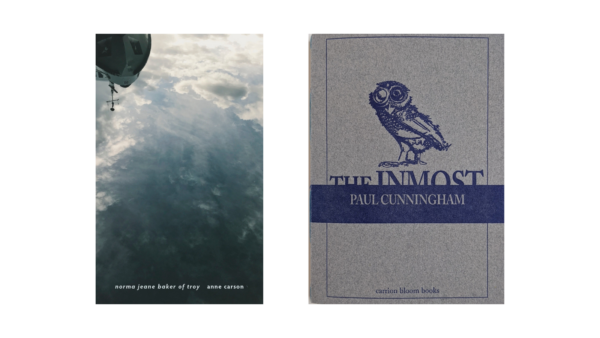
Anne Carson’s norma jeane baker of troy (New Directions) and Paul Cunningham’s chapbook The Inmost (Carrion Bloom Books) both conflate the Bronze age with the golden age of Hollywood, focusing on characters known for their beauty and death. What Carson and Cunningham have taken are stories, from Homer and Euripides, and really honed in on and formed small texts. They focus on character and voice. And doubling and redoubling that character. That voice is one but also many. What are the fortunes being told? What are the endings? All we see is smoke and mirrors.
These books are pared down. Focused. Fragmented. Told in pieces. Have humor. Held up together they resemble Warhol’s Pop Art. They both include pop culture icons that speak from the grave. These icons are forever beautiful and forever famous, just like Homer’s Helen of Troy and the goddess Athena. Even though norma jeane is the titular speaker, Carson says the words Marilyn Monroe only three times, and even then she is referred to as a cloud. Carson writes,
Managing optics cleverly will generate an alternate version of the facts, which then stand alongside the facts like a cloud in the shape of a woman, or a golden Hollywood idol in place of a mousy-haired pinup girl from Los Angeles.
Similarly, Cunningham calls his speaker, Athena, A. The icons are both the focus and are somewhat obscured at the same time. Both then double each other. norma jeane wears the mask of Truman Capote. A. is on stage as James Dean. This masquerading and crossdressing as gay icons works as ghost speaking through the mouth of another ghost. There are multiple veils and we never see under them.
Invoking A., the prophetic star in the mirror, Cunningham writes,
In the mirror
My navel stone,
my blood
way has been cut off
Carson’s norma jeane speaks as she knits the myth. She is channeling through knitting. Her story unfolds in real time. Cunningham’s characters speak like the oracle of Delphi and use haruspicy, or the inspection of the entrails of sacrificed animals.
Cunningham writes,
our inmost intensity
Intextine, I am your prey
Sticking to your beak, sticky in your throat
Intestine, my body scatters ourself
Meanwhile, Carson prognosticates as tragedy is sweeping the land:
What is that stain spreading from your neck to your knees to your doorstep to your ridiculous glass-like soul that was supposed to outlast the centuries, outlive the galaxies, survive the rules of love, master the odds of war and transcend all seven level oceans of Homer?
Another platinum blonde icon, Plath, faintly emerges. Though her name never appears. Carson writes,
I GOT THIS FROM TED HUGHES AND WHO SHOULD KNOW IF NOT TED HUGHES: Of everything she has you have absolutely nothing, she has everything too much, so you take some.
Plath smiles from her infamous kitchen. Eternally on the brink of death. Another icon drinking in fumes and telling fortunes. In her own poetry Plath says,
Perhaps you consider yourself an oracle,
Mouthpiece of the dead, or of some god or other.
Thirty years now I have labored
To dredge the silt from your throat.
norma jeane and A. both laugh through the gas. They say their part, then depart the stage. Iconic and ghostly goodbyes.
Carrion Bloom Books is currently reading chapbook submissions. They are open to translations and there is no reading fee.